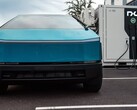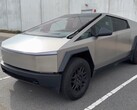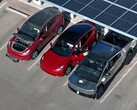The only advantage of Tesla's "revolutionary" 4680 battery, as detailed on Battery Day 2020, seems to be its lower cost, as its energy density and charging curve have proven weak points for now.
Tesla is still far from the 56% cost savings compared to the 2170 battery packs that it promised during Battery Day. The current manufacturing reductions come mainly from the space-saving design of the cells, rather than a chemistry breakthrough.
At the annual stockholder meeting last week, Elon Musk admitted that its Austin-made 4680 batteries are still more expensive than batteries coming from of its suppliers, and Tesla hopes to hit parity this year as this would be crucial for its Cybertruck cost-cutting initiative.
Speaking of the Cybertruck, its Cybercells made in Texas have improved on the energy density front somewhat when compared to the 4680 packs in the Model Y before it.
They still offer a worse charging curve than Tesla vehicles with other types of batteries, despite that the Cybertruck is Tesla's first EV built on the modern 800V architecture. Cybertruck charging speed tests, even ones done on powerful 350kW chargers, show that it is still far from the 20-minute charge that Tesla's chief engineer deemed it capable of.
For many, the culprit is its 123 kWh battery pack, as the 4680 battery in the Texas-made Model Y exhibits the same slow charging behavior, and Tesla has now stopped making it.
Tesla, however, has now amassed enough Cybertruck charging routine data from real users, and will soon be issuing the promised OTA update that will allow the driver to add 154 miles of range in 15 minutes. Hopefully, some of those findings will trickle down to the Model Y units with 4680 battery, too.
The key to halving the cost of the 4680 cells has always been the so-called dry electrode production method. It requires a fraction of the current wet cathode manufacturing facilities or energy for baking them dry, and uses less toxic chemicals.
Unfortunately, dry electrode production is what has proved elusive for Tesla, at least in the mass quantities needed for the Model Y and Cybertruck ramp-up with Gen 2 4680 cells.
In one Cybertruck walkthrough for Sandy Munro, Tesla's battery chief at the time confirmed that the pack is made with the dry method, which was a pretty exciting revelation. It remained a mystery how many 4680 batteries can Tesla produce with the dry electrode method, though, or how fast it can churn them out.
In fact, Tesla just filed a lawsuit against its ex-supplier Matthews International for stealing its trade secrets connected to dry cathode production. It is asking $1 billion in damages to recoup some of the investments made.
Said investment wasn't going with the expected speed, too, and Tesla recently laid off the person in charge of the Austin Gigafactory 4680 facilities, as it tries to spearhead production and lower costs as much as it can before it is too late.
Get the 80A Tesla Gen 2 Wall Connector with 24' cable on Amazon
Are you a techie who knows how to write? Then join our Team! Wanted:
- News Writer
Details here
Source(s)
Wes Morrill (X), Reuters


 Deutsch
Deutsch English
English Español
Español Français
Français Italiano
Italiano Nederlands
Nederlands Polski
Polski Português
Português Русский
Русский Türkçe
Türkçe Svenska
Svenska Chinese
Chinese Magyar
Magyar










